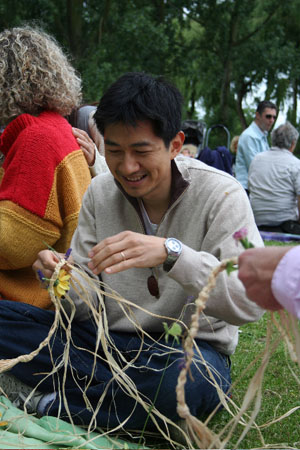What does the school ask of parents?

The community is a vital part of the life of the school and parents can be involved in many ways, for example by attending the parent study group or Eurythmy group, or by taking on such tasks as organising fairs, fundraising, hospitality at Parent meetings or Open Days, and with grounds maintenance. We understand that parents are sometimes too busy with work and other commitments to give much of their time to the school and so this is not a requirement, however, there are some ways in which every parent can support the school and we ask:
- That they work towards understanding the principles that lie behind Steiner Waldorf Education so that they know what they have chosen for their children and can give the teachers wholehearted support in their work.
- That they read the information in this handbook and on the school’s website in order to understand this particular school’s ethos and approach to their children’s education.
- That they familiarise themselves with the school’s rules, policies and procedures and, by respecting and following them and encouraging their children to do so, help with the smooth running of the school.
- That they meet their financial commitments to the school in full and communicate any difficulties in this area to the bursar immediately.
- That they ensure that their children come to school regularly, arrive punctually every day and contact the receptionist and the child’s Class Teacher as early as possible if they are going to be late or absent, or have to leave early.
- That they arrive in good time to meet their children when they have finished school for the day and leave the premises promptly unless they have a legitimate reason for being at school and their children are properly supervised.
- That their children come to school prepared: that they are dressed in suitable clothes for the weather and for the activities of the school day, that they bring enough to eat and have had enough sleep.
- That they ensure that their children’s after-school and weekend activities are appropriate and do not interfere with their school work. e.g. if children have too many organised activities they don’t learn how to organise and use their free time independently; unless recommended in specific cases, extra tutoring in Maths and English are not necessary and may compromise the way we teach these subjects and the children’s attitude to them.
- That they approach their child’s Class Teacher or Guardian directly when they have a concern, and are mindful of the harm that can be done through rumour, gossip and the misuse of WhatsApp groups etc.
- That they are open and honest in their communication with the teachers about their children’s health, family circumstances and anything else that may affect their behaviour.
- That they understand and acknowledge the effects on children of computers, tablets, smartphones, DVDs, electronic games, television, cinema and recorded music, and regulate exposure according to their children’s age. It would be of great benefit to children in the lower school, and especially Kindergarten children, if they were kept away from them entirely.
- That they attend termly parents’ evenings.
- That they offer some voluntary contribution to parent-led events such as fairs.


